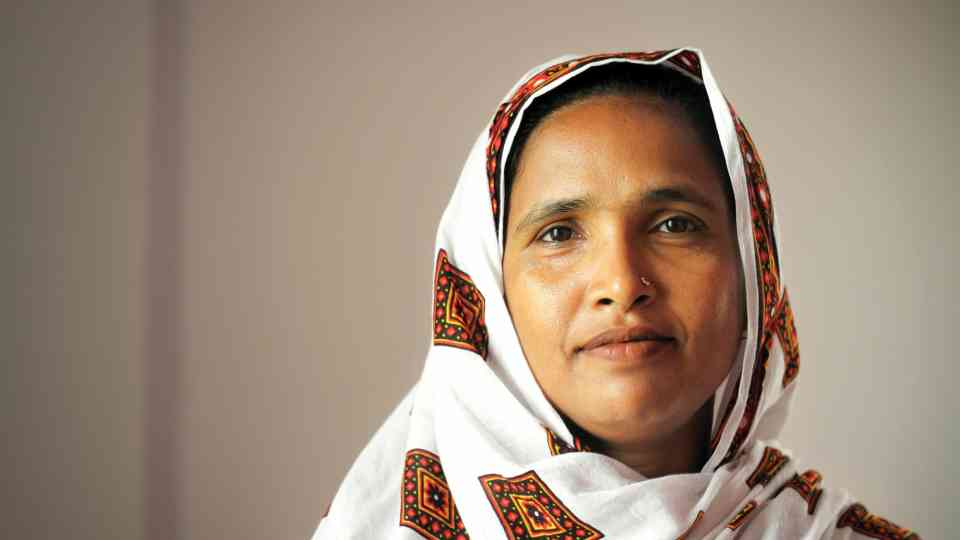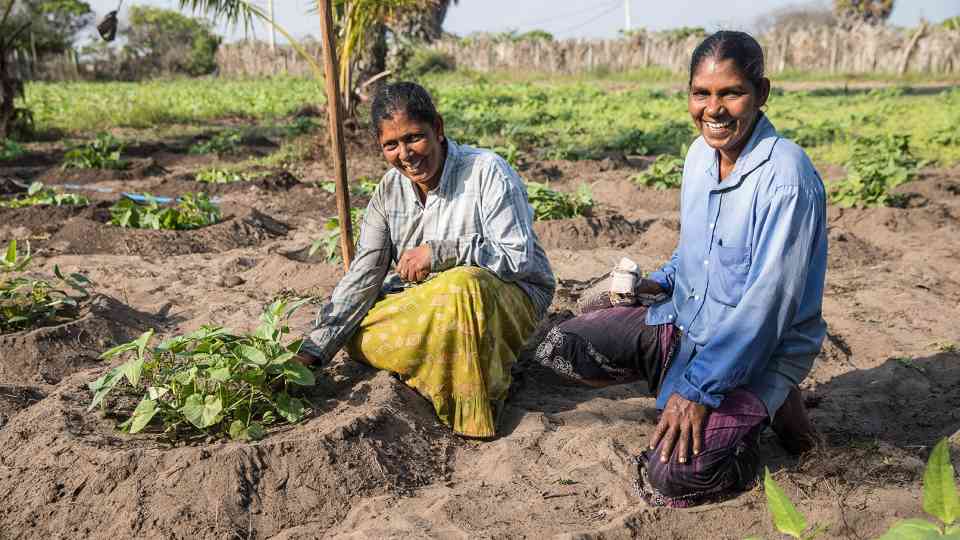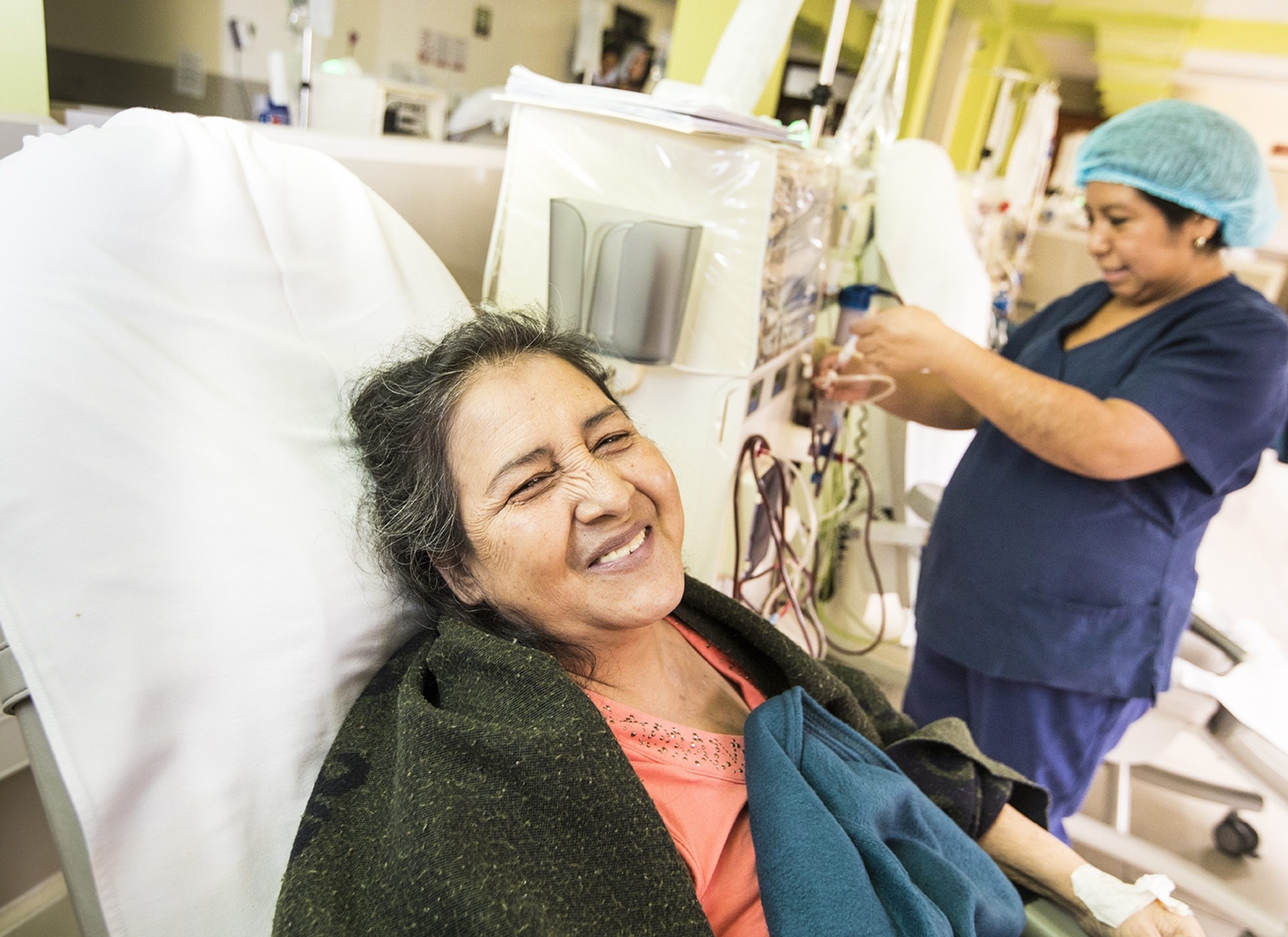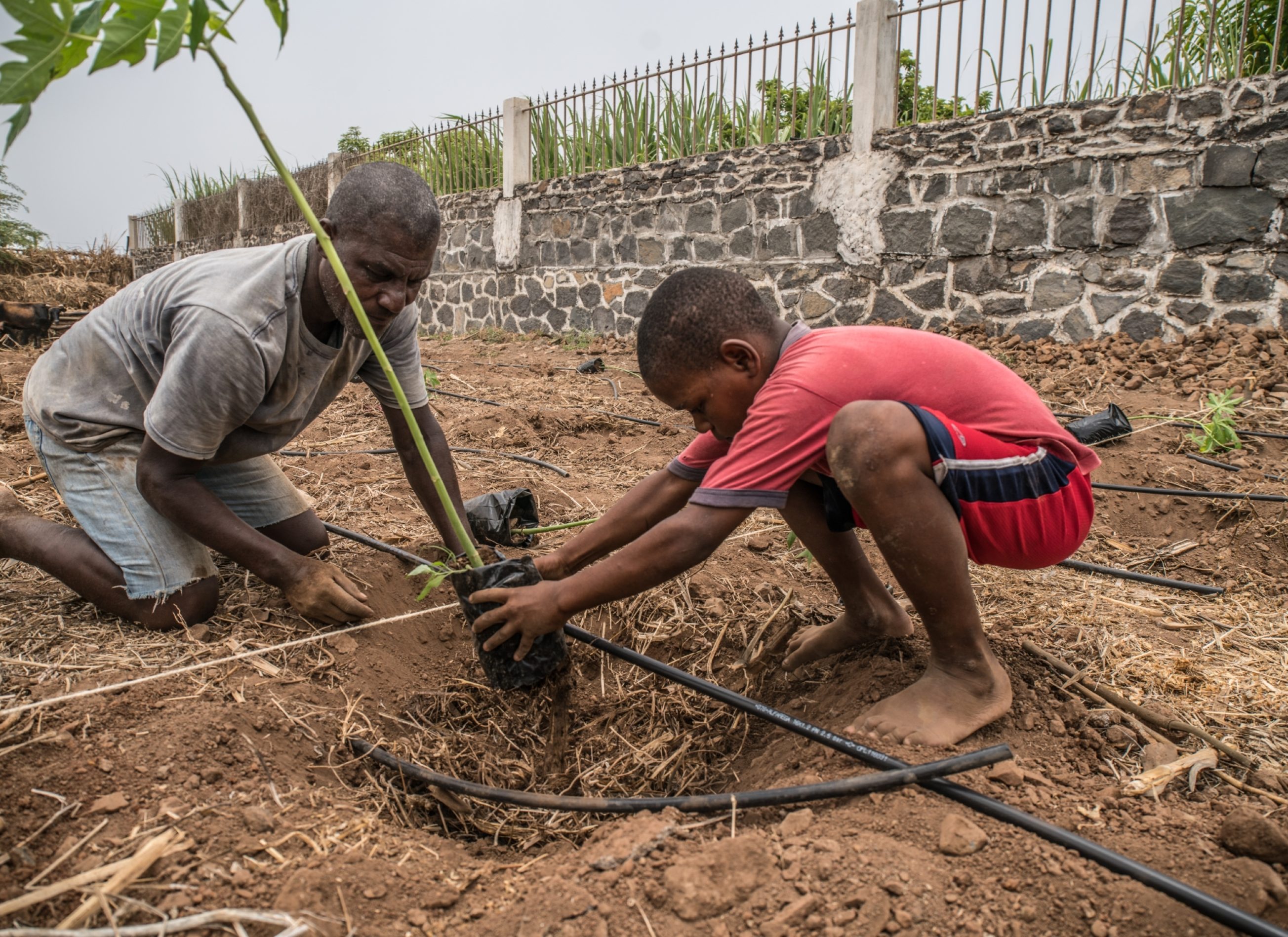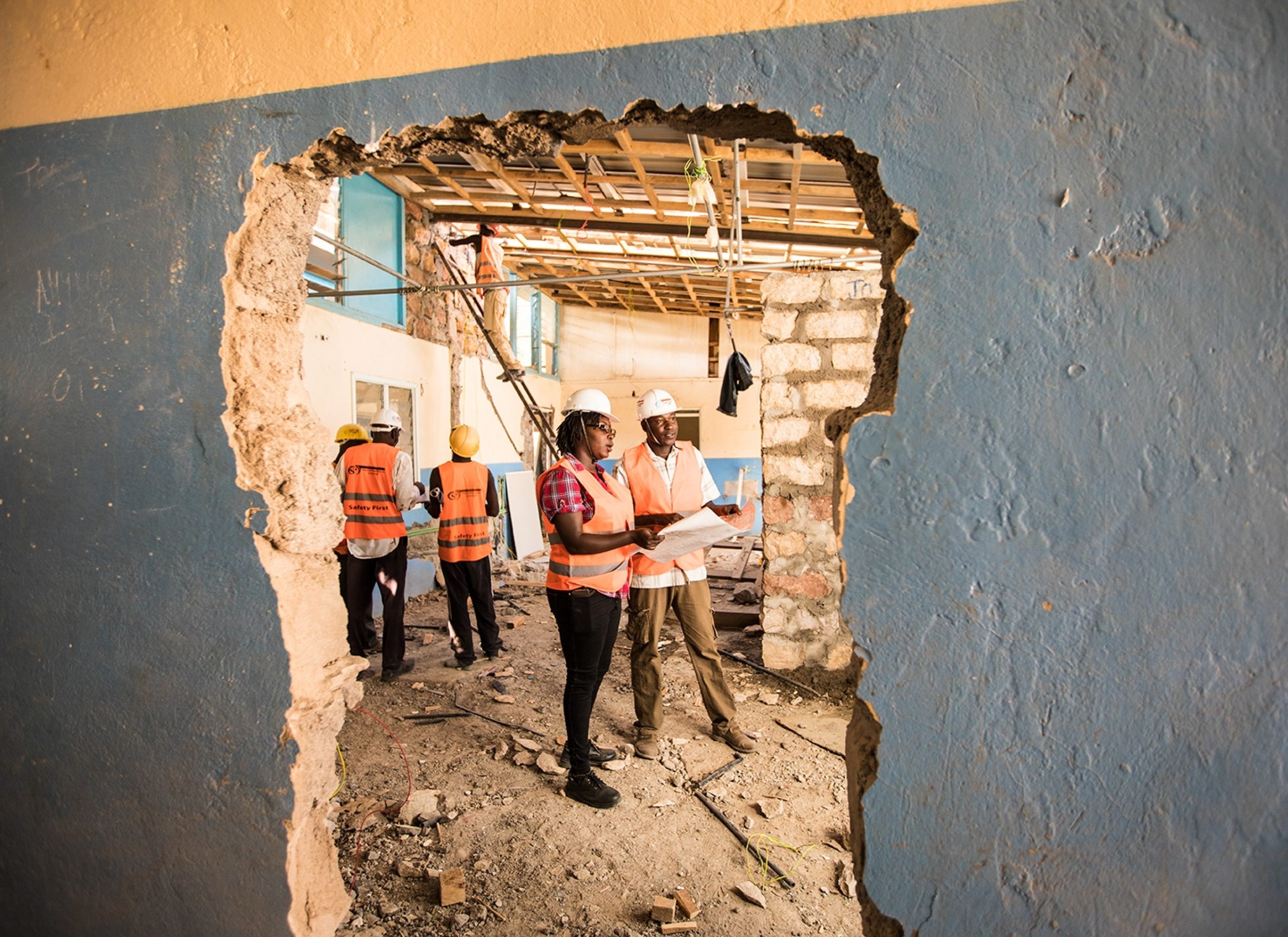Towards resilience
Sustainability, resilience and inclusion lie at the heart of our work.
2021 was a year of immense challenges. But also a year of resilience. A year of hope.
At UNOPS, we are as committed as ever to help lay the foundations for a more sustainable, resilient and inclusive future for all.
Aligned with the United Nations' Our Common Agenda, in 2021 we continued our work supporting partners to respond to the major challenges the world faces and accelerate progress on the Sustainable Development Goals.
-
6.1Mdays of paid work createdLocal livelihoods
The projects we implemented created more than 6.1 million days of paid work for local people in 2021 – creating livelihood opportunities and ensuring skills learned benefit local communities.
-
300KMof roads designed, constructed or rehabilitatedRoad infrastructure
In 2021, we designed, constructed or rehabilitated more than 300 kilometres of roads, increasing access to basic services like healthcare and education.
-
$3.4Bdelivered in projectsProject delivery
Working with partners around the world, we delivered more than $3.4 billion in peace and security, humanitarian and development projects.
From helping to strengthen public health systems to advancing climate action, equality and inclusion, explore some of the ways we supported communities on their journey towards resilience ...
A healthier future
Sustainable, inclusive and resilient health systems are key to tackling global inequalities – and safeguarding access to essential healthcare for all.
To improve access to life-saving health services for some of the world's most vulnerable communities, UNOPS built or rehabilitated 10 hospitals and 62 health clinics in 2021.
The projects were designed to help strengthen health systems that can adapt and scale to unprecedented challenges.
Argentina
As COVID-19 swept across Argentina, quick action to prepare for and respond to the escalating health crisis was needed to help save lives.

Transparent, efficient and effective health procurement can improve access to health at lower costs.
In 2021, UNOPS continued to help strengthen national health capacity by building more robust supply chains, including procuring hundreds of millions of doses of much-needed medicines and pieces of medical supplies on behalf of governments and partners.
Strengthening healthcare systems in vulnerable communities
In too many areas of the world, people are prevented from receiving quality healthcare. For vulnerable communities faced with a lack of medical infrastructure and difficulty getting vital medical equipment, receiving basic health services can seem like an impossible challenge.
To address this, UNOPS is strengthening the resilience of healthcare systems around the world, using funding from the government of Japan.

As COVID-19 continued to expose the vulnerability of health systems around the world, UNOPS helped countries address their most pressing needs and mitigate the long-term impacts of the pandemic.
From enhancing the national health system of the Philippines, to delivering medical supplies and equipment in Iraq, to refurbishing hospitals in Albania.
In 2021, UNOPS agreed almost $700 million of COVID-19 response and recovery activities to support more than 110 projects in over 80 countries.
In 2021, UNOPS worked with partners to improve access to healthcare services by constructing and rehabilitating healthcare facilities around the world.
To put us back on a path to achieving the Sustainable Development Goals and the 2030 Agenda, health systems need quality infrastructure, reliable supply chains and workforces that are equipped with the latest innovations in technology, policies and practice.
East Africa
In partnership with the European Union, we're working with the Intergovernmental Authority on Development and other UN organizations to help mitigate the health and socio-economic impact of the COVID-19 pandemic.

I wish to extend my deepest appreciation to UNOPS, the South-South cooperation of the [India-UN] Partnership Fund and the government and people of the Republic of India for their great partnership [...] I strongly believe that this newly improved infrastructure will provide an accessible, safe and comfortable space for community members to receive quality and efficient primary healthcare services.
Advancing climate action
Rising sea levels. Extreme weather events. Disrupted economies. Climate change is impacting communities everywhere. The decisions we make today will impact generations to come – it’s critical we get it right.
UNOPS is committed to supporting climate action and building a climate-resilient future.
In 2021, we continued our work to help countries establish a unified vision for their future infrastructure – in line with the Paris Agreement and the Sustainable Development Goals.
In collaboration with governments and partners – including UNEP, the University of Oxford and the Global Center on Adaptation – we championed the adoption of sustainable, resilient and inclusive infrastructure that can withstand shocks and stresses, protect lives and livelihoods, and help create equal opportunities for all.
We need infrastructure that is resilient to shocks and stresses – and that provides for and protects humanity against an uncertain future.
Climate-conscious public procurement and greener supply chains also offer huge potential for countries to lower their greenhouse gas emissions, protect natural resources and drive the shift to low-carbon economies.
In 2021, we supported partners to increase the efficiency, transparency and effectiveness of their public procurement activities, demonstrating how better public spending can benefit both people and the planet.
We’re walking the walk. Our work supporting climate action is met with a commitment to climate neutrality within our own operations. We believe measuring our carbon footprint and the sustainability of our work is crucial.
For the past 9 years, all greenhouse gas emissions (carbon dioxide equivalent) from our operations have been offset through reductions with gold standard certification developed under the UN Clean Development Mechanism.
Bangladesh
Bangladesh has embarked on a transformative journey toward building inclusive, gender-equal, sustainable and resilient infrastructure to sustain and further its development gains. In a unique multilateral partnership between the government, donors and three United Nations agencies, we’re supporting the effort.

Global
UNOPS works with the Green Climate Fund (GCF) – the world’s largest fund dedicated to supporting developing countries to shift to a low-emission, climate-resilient future – by providing grant management services for the GCF Readiness and Preparatory Support Programme.

We believe powerful partnerships and global collaboration are major allies for climate action.
The UNEP Copenhagen Climate Centre supports developing and middle-income countries in their efforts to progress toward a climate-resilient, low-carbon future and to integrate climate priorities into national development planning.
With operational support provided by UNOPS, the Centre will step up its implementation of UNEP’s climate change strategy and energy programme – towards tackling the climate emergency.
The UNEP Copenhagen Climate Centre is a vital part of our mission to deliver compelling science in support of environmental decision-making and climate action across the world.
The only way forward
We are committed to building a more equal, inclusive and diverse future – within the UNOPS family and for the people and communities that we serve around the world.
We’re on a journey towards even greater diversity and inclusion.
In 2021 and at a pivotal moment for equality, UNOPS achieved gender parity in its workforce while at the same time creating paid work for women beneficiaries locally.
Equitable representation brings value to all our people as well as the work we do with communities around the world. In 2021, 60 per cent of infrastructure projects enabled equal access for women and 37 per cent for people with disabilities.
Achieving gender equality and empowering women and girls is the unfinished business of our time, and the greatest human rights challenge in our world.
Looking ahead, we are committed to achieving a truly diverse workforce – that goes beyond gender equality – in which everyone feels like they belong. And we aim for greater inclusiveness in the results we deliver on behalf of our partners.
-
2.4Mdays of paid work for women createdWomen's empowerment
Of the 6.1 million days of paid work created by UNOPS-implemented projects, 2.4 million were undertaken by women.
-
51%of UNOPS personnel are womenAchieving parity
We've been working towards gender parity in UNOPS. In 2021, we achieved gender parity for the first time in the history of the organization.
Only by respecting diversity, and including the voices of all people, can we ensure a truly inclusive society, necessary for our efforts to build a sustainable and resilient future.
Yemen
The rehabilitation of health centres – including Yemen’s leading maternal and children’s hospital – is helping provide better care for thousands of patients.

Supporting crisis recovery
With funding from the World Bank, UNOPS is supporting the government of Mozambique's efforts to foster longer-term peace and economic development. This includes implementing cash-for-work programmes targeting women, providing vocational training for women and youth, and ensuring women's active participation in peacebuilding committees.

Today, tomorrow and for years to come.
Now more than ever, our world needs new approaches, renewed ambition and robust action to respond to the challenges we face.
The UNOPS family proudly works towards a brighter future for our planet and all its people.
Join us
In over 80 countries around the world, our people come together with communities and partners – to share ideas, knowledge and expertise, to help build a sustainable future – for people and the planet.











